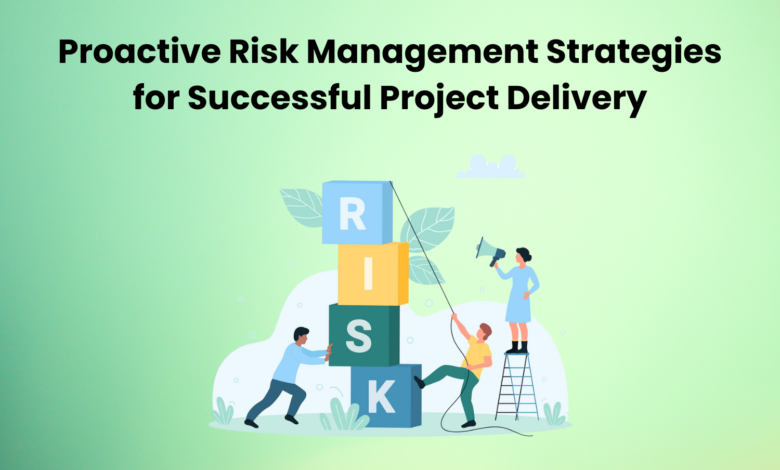Proactive Risk Management Strategies for Successful Project Delivery

In project management, reducing risks and navigating uncertainty are essential to a project’s successful completion. Understanding and implementing proactive risk management tactics becomes critical as firms work to improve their project management capabilities.
In this blog, we will look at ways to Managing Project Risks and Uncertainty, which can have a big impact on the outcome of any project. The information provided here will be helpful regardless of your experience as a project manager or desire to improve your abilities through Project Management Courses.
Table of Contents
- Project Management Courses and Their Role in Risk Mitigation
- The Essence of Managing Project Risks and Uncertainty
- Identifying Risks Early on
- Quantitative and Qualitative Risk Analysis
- Integrating Proactive Risk Management Into Project Planning
- Creating a Robust Risk Management Plan
- Setting Realistic Project Objectives and Milestones
- Building a Proactive Risk Culture Within the Project Team
- Effective Communication and Collaboration
- Continuous Monitoring and Adaptation
- Utilising Technology for Proactive Risk Management
- Risk Management Software and Tools
- Data Analytics for Predictive Risk Modelling
- Conclusion
Project Management Courses and Their Role in Risk Mitigation
Before getting into the specifics of proactive risk management, it’s important to recognise project management courses’ role in providing professionals with the necessary skills and information. Students enrolling in extensive project management courses receive a strong foundation and insights into various project execution topics. These classes provide a wide range of subjects, including risk management techniques, so that professionals can face the difficulties in completing projects.
The Essence of Managing Project Risks and Uncertainty
Anticipating difficulties and unknowns early in a project’s lifecycle is essential to effective project management. The goal of managing project risks and uncertainty is to detect, evaluate, and reduce these risks early on rather than trying to eliminate them. This proactive approach greatly increases the probability of the project succeeding.
Identifying Risks Early on
The first stage in proactive risk management is identifying possible threats. This entails thoroughly examining the project’s goals, objectives, and surrounding environment. Project management courses frequently emphasise the significance of comprehensive risk identification and the necessity of a collaborative approach involving project teams, stakeholders, and subject matter experts.
Quantitative and Qualitative Risk Analysis
After identifying hazards, a critical next step is to analyse them using quantitative and qualitative methods. Quantitative risk analysis allows project managers to efficiently set priorities and distribute resources by assigning prospective risks numerical values. However, the qualitative analysis explores the broader implications of risks by considering variables, including stakeholder relationships, project reputation, and strategic alignment. By balancing these two strategies, project managers can thoroughly grasp the hazards.
Integrating Proactive Risk Management into Project Planning
Creating a Robust Risk Management Plan
The project planning stage easily incorporates proactive risk management. A well-written risk management strategy specifies the approaches, resources, and techniques that must be used at every project stage. This strategy should be flexible, changing as the project develops and new hazards appear. Project management courses frequently emphasise the significance of a flexible risk management plan that adjusts to changing conditions.
Setting Realistic Project Objectives and Milestones
Setting reasonable project goals and milestones is crucial to proactive risk management. Overly ambitious goals and unrealistic timeframes can increase the likelihood of risks and uncertainties, causing the project to fail. Project management courses stress the importance of matching project objectives with organisational capabilities and external restrictions to create a balanced and workable plan.
Building a Proactive Risk Culture Within the Project Team
Effective Communication and Collaboration
Not only project managers but also the project team as a whole are involved in proactive risk management. Team members can share their views on potential hazards by creating a collaborative environment and maintaining open lines of communication. As project management courses frequently emphasise, team dynamics and good communication greatly aid early risk mitigation.
Continuous Monitoring and Adaptation
A culture of proactive risk management depends on ongoing observation and adjustment. The project team can keep up with changing risks and uncertainties by conducting regular project reviews, risk assessments, and feedback loops. The discipline of continual assessment is ingrained in project management courses, guaranteeing that risk management techniques stay applicable and efficient throughout the project lifespan.
Utilising Technology for Proactive Risk Management
Risk Management Software and Tools
Using technology is essential to proactive risk management in the digital age. These days, project management courses frequently incorporate modules on the newest technologies and software for risk management, simplifying the identification, analysis, and tracking of risks. With the help of these real-time insight tools, project managers can act quickly and decisively.
Data Analytics for Predictive Risk Modelling
Data analytics have revolutionised proactive risk management. Professionals can leverage the power of predictive risk modelling by enrolling in project management courses that emphasise data-driven decision-making. Project managers can foresee future hazards by analysing past data and patterns and developing methods to limit their impact.
Conclusion
Success in project management depends on your capacity to handle uncertainty gracefully. As this blog explains, proactive risk management is essential to project completion. Whether you’re a seasoned project manager or considering taking project management classes, incorporating these tactics into your methodology will improve your capacity to guide projects toward favourable results.
Adopt a proactive attitude, stay updated, and arm yourself with the information and resources required to manage project risks and uncertainty successfully. After all, in project management, preparation now leads to success tomorrow.


